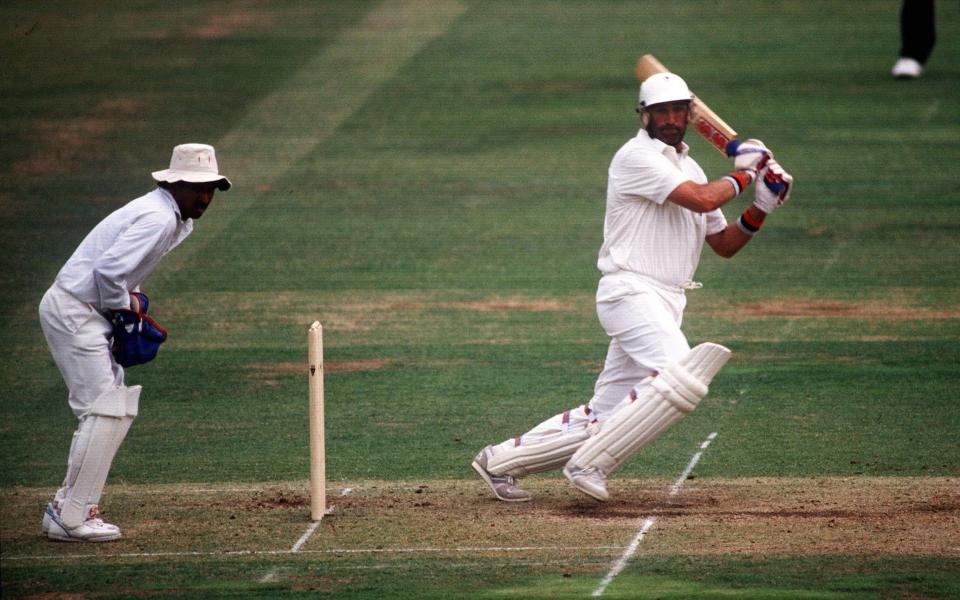
Graham Gooch is posing for our photographer in the swanky London district of Fitzrovia, barely a six-hit from Lord’s. If he looks in excellent nick for his 70 years, it might be because he has just come from an appointment at Advanced Hair Studios, the bonce-weaving experts he has been promoting since the mid-1990s.
Perhaps it’s unprofessional to say so, but the evergreen Gooch was my hero as a boy. Poring over county scores in the school library, I celebrated whenever he steered Essex to victory over our great rivals: Middlesex and Nottinghamshire. Then, a decade or so later, I cheered again when Wisden identified him as the most prolific batsman of all time.
And yet, despite those 67,000 runs, the writers of the day spilled less ink over his majestic stroke-play than they did his disconsolate body language, which once led Ted Dexter to declare that Gooch had “the charisma of a wet fish”. As a man with a well-concealed dry wit, he played up to this billing as a cricketing jobsworth. On the eve of his final Test, a photographer asked him to smile, and he replied “Can’t – it would spoil the image.”
So, how does Mr Pragmatic feel about England’s newfangled “Bazball” tactics? The answer, as we settle down to lunch, is nuanced. “It’s good to watch,” Gooch muses, over a helping of Cornish plaice and sourdough bread. (In typically fitness-conscious style, he doesn’t keep any bread in the house, but is now compensating with the same appetite he once showed for “daddy hundreds”.)
“I’m all in favour of trying to go out there from ball one, set the agenda, take the initiative,” he continues. “My mentor at Essex was Keith Fletcher, who was successful in three-day cricket because he never let the game drift. And I was amazed that, on the first ball of the Ashes, Australia had a sweeper out either side. They were reacting to England’s perceived plan before it had even started.”
Is there a “but” coming? There surely has to be. As England’s batting coach in the early 2010s, Gooch once laid into Kevin Pietersen for a series of self-destructive, Bazball-style dismissals. So it feels reassuring when he reverts to his standby mode of grizzled common-sense.
“You have to be smart at times too,” he says. “In the second Ashes Test there was the short-ball fiasco. The score was 180 for one, and then it was like we were going out there with a bag of balls and a mitt and saying ‘Spread out, I’ll hit you a few catches.’ Plus, in the first Test, was it smart to declare with our best player on 130-odd?
“Now, to me, Joe Root doesn’t play Bazball. And that’s right: you need a balance, some Alastair Cook/Geoffrey Boycott-style players and some Ian Botham/David Gower-style ones. Because what you need is to set different problems for the opposition. Today, most of England’s players are taking the ball on the up because they’re bred on Twenty20 cricket.”

‘Gower was the best I played with’
Aficionados of 1990s cricket might be shocked to read that approving mention of Gower. Didn’t the two Gs fall out over Gower’s lazy waft at Adelaide during the 1990-91 Ashes? And weren’t questions asked in Parliament after Gooch left his frenemy at home for an ill-fated tour of India two years later?
The answers are “yes” and “yes”, but then Gooch has previously acknowledged that he erred in his opposition to Gower. Today, the two men are good mates, even if our lunch found Gooch highlighting their temperamental contrasts all over again.
“We did a theatre tour together recently,” he explains, “and we were chatting one afternoon about our approaches to the game. I was a player who evolved over 20 years. I changed my technique, worked on my fitness, and I thought differently about myself when I became captain. It just quietened the chimp on my shoulder, so that instead of thinking ‘Will I do well today?’ I was thinking ‘I will do well today.’ David was the opposite. ‘I understand where you’re coming from,’ he told me. ‘But I’m afraid I was the same sort of player at the beginning of my career that I was at the end.’”
Gooch emphasises that he no longer considers one approach better than the other, and that “David was a brilliant batsman all the way through – the best I played with for England.” But it is Gooch’s questing mindset, rather than Gower’s instinctive genius, that has proved more influential in the long run.
In particular, Gooch’s once distinctive stance – bat raised like a periscope – has become standard practice for today’s Bazballers, completely eclipsing the Boycott-style orthodoxy of pointing the toe at the ground until the ball is released. In an unexpected twist, the innovation turns out to have emerged from an early instance of video analysis. After the 1978-79 Ashes, Gooch returned home to find that his wife’s Aunt Grace had recorded two-and-a-half months of highlights off the TV.
“Grace had bought one of the first video recorders,” he explains. “It was a massive machine, with tapes the size of a book. In those days you never really saw yourself on TV. But I saw the way I was playing, and I thought ‘I can’t play like this, I’m falling over all the time.’ I knew I had to make a change for the 1979 season, to get my eyes level. The only way I could get comfortable was not to stand in the conventional way, but to lift the bat off the ground.” He averaged 45 in the short England-Australia series of 1979-80, a significant improvement on 32 the previous winter.

‘Mitchell Johnson got in our heads’
Over his career, Gooch has come up not only with this important innovation, but with several oft-repeated zingers, including “Who writes your scripts?” (to Ian Botham, who had just taken a wicket with his first ball back after a drugs ban), and “If it had been a cheese roll, it would never have got past him” (after Shane Warne’s ball of the century to Mike Gatting).
But the maxim he lived by was “If you fail to prepare, you prepare to fail.” This is why he used to call up his own personal batting coach – Essex team-mate Alan Lilley – for private net sessions between team practices. After retiring in 1997, he applied the same rigorous approach while coaching Essex between 2001 and 2005, then had a four-year stint as England batting coach at the peak of their Andrew Strauss-led dominance.
“We had a good side,” recalls Gooch, who is still a regular attendee at Tests, while also turning out for every Essex home match as an ambassador. “Broad and Anderson, Ian Bell, Matt Prior. We didn’t have any bad cricketers. When we batted out the game in Brisbane [in 2010-11], that’s the one photograph I’ve ever taken on tour. I’ve still got it on my phone: 517 for one. I’ve never seen anything like that. We expected the Aussies to win and they expected to win as well. Two days to bowl us out? And that won us the series. Generally, if you go down at Brisbane there’s no coming back.

“The funny thing was that, when we went back three years later, we had pretty much the same personnel. But it just wasn’t there. Something was different. They went after Swann a bit. Trott wasn’t in the same head-space: you could tell because he used to net forever but now he’d have just a handful of throwdowns. And Mitchell Johnson got into the heads of some of our players.” (Not without reason: Gooch acknowledges that Johnson was bowling as fast as Patrick Patterson, the 1980s West Indian who had been the only opponent to make him fear for his own safety on a cricket field.)
‘I thought Steven Finn might be like Dennis Lillee’
Gooch’s tenure ended after that 2013-14 Ashes whitewash. England’s cycle of dominance could not survive Swann’s controversial retirement, Trott’s burn-out and the persecution of Pietersen, who became the tour scapegoat for allegedly staring out of the window during team meetings.
Yet one of his most poignant memories relates to the bowlers. “In 2010, when Steven Finn played his first Test, I said to Andy Flower, ‘You’ve got a potential leader of the attack,’” he recalls. “But then, on the 2013-14 tour, a comment came out that Finn was ‘unselectable’ – which was horrible but accurate, because his game really wasn’t in the right place. I remember him sitting on the ground at the Allan Border Oval in Brisbane and crying his eyes out. It was distressing.
“I thought he might refine himself like Dennis Lillee, who had a big gangling run-up when I first faced him, or Richard Hadlee, but it never quite happened. Lovely lad though. The nicest three players I’ve been involved in coaching are Alastair Cook, Chris Woakes and Steven Finn. Not that I’m saying the others weren’t nice…”
Gooch’s focus on self-improvement runs through every theme we address, and explains why – despite his admiration – he could never understand Gower’s reluctance to peer under the bonnet of his own engine. Returning to Bazball one more time, he suggests that this still-novel policy needs refinement of its own.
“I think Bazball is absolutely fantastic. I don’t really have anything against it. But I think … it’s easy after the event, but you can get carried away with it. The other question that interests me is whether it will rub off on other teams. This sort of approach needs the captain and coach to be as one. You have to believe in it because you are going to take some setbacks, when it all goes wrong.
“Also, in India, we will see whether they can employ an attacking tactic against the turning ball. You can certainly employ it if the ball is turning into you, but it’s more difficult when it’s turning away from you. It’s exciting because, when you turn up to watch England these days, you never know what’s going to happen next. Except for one thing: it won’t be normal.”
Article courtesy of
Source link